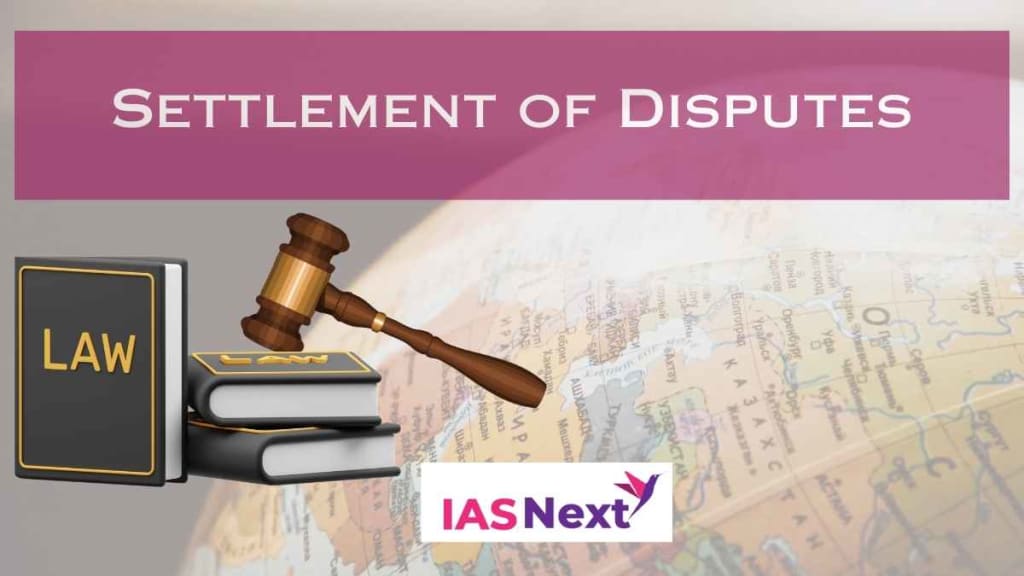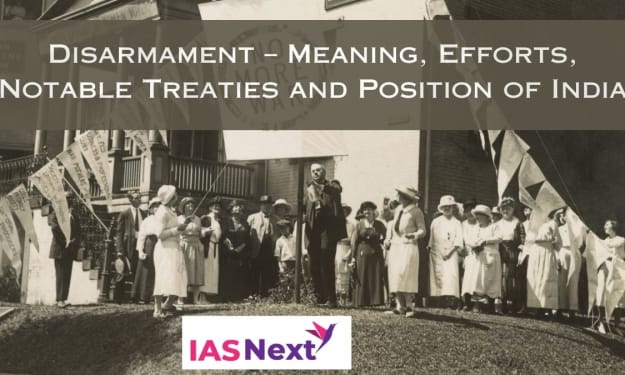Settlement of Disputes
IAS NEXT is a topmost Coaching Institute offering guidance for Civil & Judicial services like UPSC, State PCS, PCS-J exams since more than 10 years.

Introduction
Disputes are inextricably linked to international relations. Increasingly these disputes are no longer just primarily between states but also between states and other parties like international organizations and other non-state actors, and between these actors mutually. In this context, the Charter of the United Nations (UN) plays a major role, in particular, regarding disputes between states. Article 2 of the UN Charter States that all Member States have to settle their international disputes by peaceful means in such a manner that international peace and security, and justice are not endangered. This view was again confirmed in 1982 in a resolution (Res. 37/10) of the UN General Assembly, the so-called Manila Declaration on the Peaceful Settlement of International Disputes.
The expression ‘dispute’ cannot be precisely defined. In a wide sense, it may mean ‘a disagreement on a point of law or fact, a conflict of legal views or of interests between two persons.’ In order to establish whether a dispute exists, it must be shown the claim of one party is opposed by the other. However, whether there exists an international dispute is a matter for objective determination.
The difference which matters the most – Political or Legal?
The phrase “questions of a legal nature” is employed in the Conventions for the Pacific Settlement of International Disputes of 1899 and 1907, as well as in the Statute of the Permanent Court of International Justice, to denote disputes considered especially suited for arbitration, i.e. peacefully and judicially solved, in a layman’s language.
Not all disputes may be adjudicated by a judicial body. Some of them cannot be settled by a mere application of law; they have a “political” character, and they should be dealt with by a “political” character, and they should be dealt with by a political organ. Only if their character is “legal” are they suitable for court’s decision.
Most cases involve both political and legal elements. If both parties rely, in their assertions, on international law, the dispute is clearly a legal or justiciable one. If one of them challenges some rule of law as unjust and seeks to protect its interests which find no support in the positive legal system, the dispute has a purely political character. Thus, in most cases, the classification of a dispute will depend on the qualification given to it by the parties. In many cases, however, it will be difficult to characterize the dispute.
The importance of deciding that whether a dispute is a ‘political’ or a ‘legal’ one can be understood from the statement made by Roosevelt, while commenting on the treaties of arbitration negotiated in 1911 by the United States with Great Britain and France:
“It would be not merely foolish but wicked for us as a Nation to agree to arbitrate any dispute that affects our vital interest or our independence or our honor; because such an agreement would amount on our part to a covenant to abandon our duty, to an agreement to surrender the rights of the American people about unknown times in the future. Such an agreement would be wicked if kept, and yet to break it – as it undoubtedly would be broken if the occasion arose- would be only less shameful than keeping it……. Of course the same reasons which make it impossible to agree to arbitrate questions that involve our vital interest, independence, or honor, apply to any proposal to submit to others the question whether or not a given dispute of such a kind is ‘justiciable’, or does or does not involve such questions and therefore should or should not be arbitrated.”.....Read more
Read Also: Disarmament – Meaning, Efforts, Notable Treaties and Position of India
About the Creator
Enjoyed the story? Support the Creator.
Subscribe for free to receive all their stories in your feed. You could also pledge your support or give them a one-off tip, letting them know you appreciate their work.





Comments
There are no comments for this story
Be the first to respond and start the conversation.